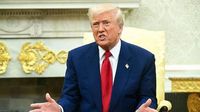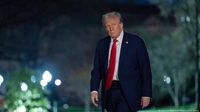On Monday, April 7, 2025, President Donald Trump announced that the United States plans to hold direct talks with Iran regarding its nuclear program. Speaking during a meeting with Israeli Prime Minister Benjamin Netanyahu, Trump described the upcoming discussions as a "very big meeting" set for Saturday, April 12, 2025, and emphasized that these talks would occur at "almost the highest level." Iran's foreign minister confirmed the discussions, labeling them as "indirect high-level" talks, with Oman serving as the host country.
Trump's remarks come amidst heightened tensions surrounding Iran's nuclear ambitions. He warned that if the negotiations fail, "Iran is going to be in great danger," reiterating that "Iran cannot have a nuclear weapon." This statement reflects the long-standing U.S. position on Iran's nuclear capabilities, a concern shared by Israeli leadership. Netanyahu, who views Iran as a significant threat to the stability of the Middle East, echoed the sentiment that Iran must not acquire nuclear weapons.
The backdrop of these discussions is marked by a complex history between the U.S. and Iran. During President Joe Biden's administration, indirect talks were held, but little progress was made. The last direct negotiations occurred during Barack Obama's presidency, which led to the 2015 international nuclear agreement designed to curtail Iran's nuclear program in exchange for lifting sanctions. However, Trump unilaterally withdrew the U.S. from this agreement in 2018, after which Iran ceased adhering to its terms.
In a related development, Iranian President Masoud Pezeshkian has expressed skepticism regarding direct talks with the U.S., stating a preference for indirect communication unless the U.S. addresses its past "misconduct" to establish a new basis for trust.
During the Oval Office meeting, Trump and Netanyahu also discussed Israel's economy, particularly following the imposition of 17% tariffs on Israeli goods. Netanyahu vowed to eliminate Israel's trade deficit with the U.S., asserting, "We intend to do it very quickly, we think it’s the right thing to do and we’re going to also eliminate trade barriers, a variety of trade barriers that have been put up unnecessarily." However, Trump appeared noncommittal about reducing tariffs, responding, "maybe not" when asked about the possibility.
Additionally, the two leaders confirmed their discussions regarding ongoing efforts to secure the release of hostages from Gaza. They expressed hopes for the success of another deal aimed at freeing more hostages. Netanyahu emphasized Israel's commitment to releasing all hostages and eliminating Hamas from Gaza, which has been a focal point of his administration's policy.
Meanwhile, public sentiment in Israel appears divided. On the same day as Trump's announcement, hundreds of Israelis protested in Tel Aviv against Netanyahu and his government's recent moves to oust top security and legal officials, as well as to resume military action in Gaza. Protesters voiced their concerns about the government's actions, with one demonstrator, Menashe Yehezkel-Baum, stating, "We're here today to send a very clear message: stop destroying our very basic and essential institute like the Supreme Court, the army, the security services, the police." This reflects a growing discontent among segments of the Israeli population regarding the government's direction.
As the U.S. prepares for its upcoming talks with Iran, the stakes are high. The outcome of these discussions could have far-reaching implications not only for U.S.-Iran relations but also for the broader geopolitical landscape of the Middle East. With both Trump and Netanyahu advocating for a strong stance against Iran's nuclear ambitions, the international community will be watching closely to see if these negotiations can pave the way for a new phase in U.S.-Iran relations.
In summary, the planned discussions between the U.S. and Iran represent a critical juncture in a long-standing diplomatic standoff. While Trump has set a tone of urgency and caution, the complexities of past agreements and regional dynamics continue to loom large over the talks. As both nations prepare for the meeting, the hope remains that diplomatic engagement can lead to a more stable and secure future for the region.





